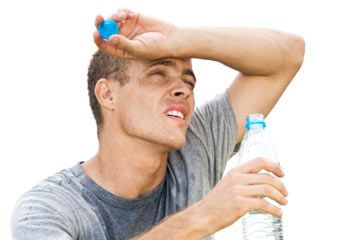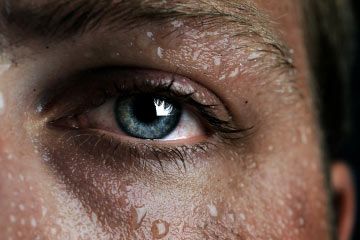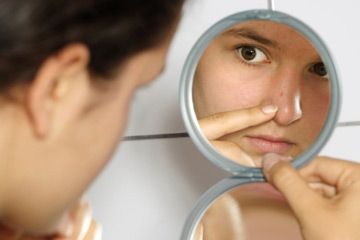Your face is literally the first place you can clinically sweat through your eccrine glands. Although your body's sweat glands can function before birth, physicians don't consider sweating possible until one full day after birth, with the face being the first place it can occur [source: Schachner and Hansen]. For some, it may seem like once the sweating started, it never stopped.
Your face -- specifically your forehead and scalp -- are covered with eccrine glands. They're part of a series of reactions that end in what we recognize as sweating. The eccrine glands are activated by the production of acetylcholine, which is triggered when a system of brain structures, including the hypothalamus, experience an increase in temperature [source: Hall]. These reactions keep the body from overheating.
Advertisement
In other words, it's very normal to sweat on your face when you're hot, whether it's from sitting outside in high temperatures or exercising. Since the forehead, along with the palms of your hands and the soles of your feet, contain the highest concentration of eccrine glands, it's normal to sweat a lot on your face when you're hot [source: Hyperhidrosisweb]. But if facial sweating becomes problematic, or if it occurs constantly or in situations where it shouldn't, like in a cool, indoor environment, perhaps it's time to get to the bottom of the trouble.
A condition known as hyperhidrosis -- excessive sweating -- can extend to the face. Craniofacial hyperhidrosis includes excessive sweating of the forehead, scalp and back of the neck [source: Mayo Clinic]. Interestingly, despite the prevalence of eccrine sweat glands in the head, craniofacial hyperhidrosis is the rarest form of hyperhidrosis. This also means it's likely that your excessive facial sweating isn't necessarily a clinical condition.
If it is, there are a couple reasons why you may be sweating so much. Primary hyperhidrosis is thought to come from emotional triggers, although exactly why remains a mystery. Secondary hyperhidrosis is the result of another, larger medical condition. A number of illnesses have been linked to hyperhidrosis; malignant tumors, infections, heart disease, Parkinson's disease and hyperthyroidism all have excessive sweating as a symptom [source: MedlinePlus]. And since the hypothalamus controls glandular function as well as the regulation of body temperature, an endocrine disorder may also be responsible.
A physician can make a diagnosis between primary and secondary hyperhidrosis. While treatment of the underlying condition should also clear up secondary hyperhidrosis, your doctor has a number of options to treat a case of primary hyperhidrosis. One of the most prevalent ways of combating hyperhidrosis, including on the face, is the use of aluminum chloride, the main ingredient in antiperspirant. In the case of primary craniofacial hyperhidrosis, though, your physician won't prescribe a solid stick to rub across your forehead, but he or she can give you an ointment or cream containing the ingredient instead.
You may also be prescribed anticholinergic drugs, which block the reception of acetylcholine. Remember, this is the neurotransmitter that activates eccrine sweat glands. Botox, the derivative of the poison botulin, relaxes sweat glands and has helped treat other forms of hyperhidrosis concentrated in the underarms and hands [source: Mayo Clinic].
Perhaps the best way to combat hyperhidrosis is through relaxation techniques. Again, since emotional triggers -- especially stress -- can cause primary hyperhidrosis, reducing the stress in your life and the way you react to stressful situations may help reduce facial sweating.
Advertisement



